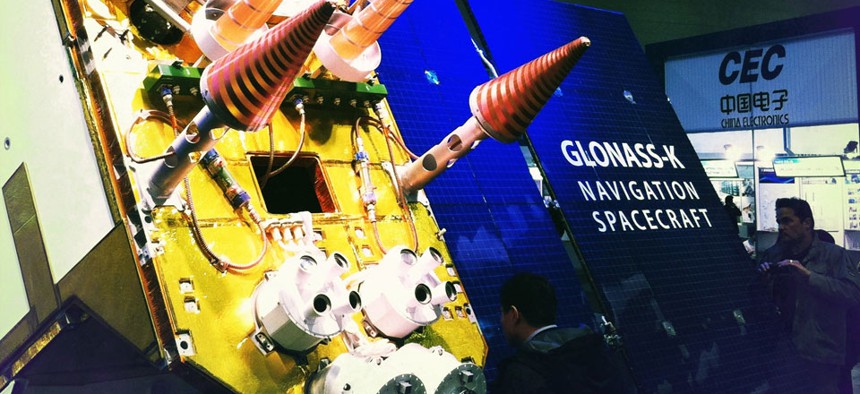U.S. Considers Russian Request to Install Satellite Monitoring Stations

A full-sized model of the Russian Next-Generation Glosnass-K Satellite was displayed at CeBit 2011. Flickr user PaGn
Plan has strong congressional opposition.
The Obama administration continues to review Russian proposals to install up to six monitoring stations on U.S. territory for its satellite navigation system, despite strong opposition in Congress.
In May 2012, Russia made a formal request to install base stations in the United States to monitor its Global Navigation Satellite System, or GLONASS. Kenneth D. Hodgkins, director of the State Department’s Office of Space and Advanced Technology, told a space navigation and timing advisory board meeting last Thursday that “U.S. officials have requested more information through discussions led by State in coordination with executive branch departments and agencies.”
Hodgkins added, “Based on the ongoing discussions, the original Russian proposal has evolved and is currently under review within the U.S. government.” He did not provide additional details on changes in the Russian proposal. The Federal Aviation Administration and NASA “initially expressed interest in acting as hosts” for the Russian monitor stations.
On Nov. 16, The New York Times reported that the CIA and the Pentagon “have been quietly waging a campaign to stop the State Department” from approving installation of the GLONASS monitoring stations on U.S. soil.
The Pentagon and CIA fear the monitor stations would help Russia spy on the U.S. and improve the accuracy of GLONASS, a system designed to rival the U.S. GPS satellite navigation system.
Sen. Roger Wicker, R-Miss., on Nov. 19 introduced an amendment to the 2014 National Defense Authorization Act that prohibits the construction of foreign ground stations in the U.S. unless the Defense secretary and the director of national intelligence certify that the construction of the stations would not be used to gather intelligence or improve the accuracy of any foreign weapons systems.
“I am deeply concerned about the Russian proposal to use U.S. soil to strengthen its GPS capabilities,” Wicker said. “These ground monitor stations could be used to gather intelligence. Even more troubling, these stations could actually improve the accuracy of foreign missiles targeted at the United States,” he added.
Wicker, in remarks on the Senate floor, said he viewed the administration’s embrace of the GLONASS monitor stations as a way to improve its “failed” relations with Russia. “We have every reason to be skeptical of Russia's intentions to utilize GPS monitoring stations on U.S. soil. Let me repeat this: GPS monitoring stations controlled by Russia on U.S. soil,” Wicker said.
Representative Mike D. Rogers, R-Ala., told the Times he had sent letters to Defense Secretary Chuck Hagel, Secretary of State John Kerry and the director of national intelligence, James R. Clapper Jr., asking for an assessment of the impact on national security of the GLONASS monitoring stations. “I would like to understand why the United States would be interested in enabling a GPS competitor, like Russian GLONASS, when the world’s reliance on GPS is a clear advantage to the United States on multiple levels,” Rogers told the Times.
Monitoring stations, which include GPS receivers and an electronics package, are essential to operation of satellite navigation system, feeding information back to central control stations to help calculate precise orbits. The U.S. operates 16 GPS monitor stations wordwide, including sites in the lower 48 states, U.S. territories such as Guam, and in foreign countries such as Argentina, Australia, Bahrain, Ecuador, South Africa, South Korea and the United Kingdom.
Russia plans to install 40 GLONASS monitor stations within its own borders, as well as ten abroad. It installed its first overseas station in Brazil in February.






